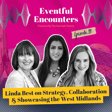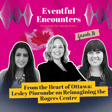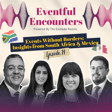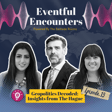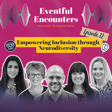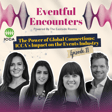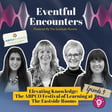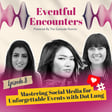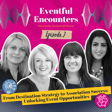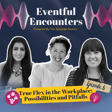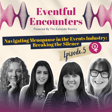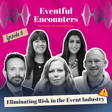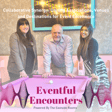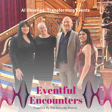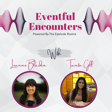Become a Creator today!Start creating today - Share your story with the world!
Start for free
00:00:00
00:00:01

Everyone's Welcome: Making Space for All in Events
In an era where diversity, equity, and inclusion (DEI) are at the forefront of industry conversation, few are challenging the status quo quite like Rory Archbold, founder of New Intent. Speaking live at IMEX Frankfurt on the Eastside Rooms podcast Eventful Encounters, Rory delivered a timely and candid conversation on what inclusion in the events sector really looks like – and how far we still have to go.
Transcript
Introduction to Eventful Encounters and DEI Focus
00:00:00
Speaker
Hello and welcome to Eventful Encounters, live from IMAX Frankfurt. We're your hosts, I'm Leanne. And I'm Sunita, and today we're diving deep into a conversation that sits at the heart of what the events industry should be talking about.
00:00:12
Speaker
Diversity, equity and inclusion.
Interview with Rory Archbold on DEI in Events
00:00:14
Speaker
Joining us is someone who's been leading that charge, challenging norms and sparking real conversations across the global event space. The founder of New Intent, Rory Archbold.
00:00:25
Speaker
Rory, welcome to Eventful Encounters. It's great to have you with us. First things first, how does it feel to be back at IMEX this year and what's caught your attention on the show for all? Well, thank you very much for having me. It's a pleasure to see you both. You are so welcome. Honour to be part of this illustrious podcast. Thank you. It is great to be back. It is absolutely great to be back in Frankfurt. But these are three long, long days. They are. Long days. And so I'm not really looking forward to that part, but that is the nature of the beast. But it's great to catch up with people.
00:01:01
Speaker
You're seeing people from all over the world that you only see once a year in Frankfurt. So it is great to be back and the sun is shining. How can we complain? Yeah, we're very lucky actually.
Founding New Intent and DEI Challenges
00:01:12
Speaker
you founded New Intent to Shake Up How We Think About Inclusion and Business Events.
00:01:17
Speaker
What was the moment or the experience that lit the fire for you? What made you say, enough, something needs to change? Oh, how long do you have? I know. know. Well, we want to know your story. And, you know, because you're passionate about it we want to get that across to our listeners too.
00:01:34
Speaker
Yes, im think of this I think this is the third year of new intent. So if we look back over the years, i attend a lot of industry events. It's an absolute privilege and I never take it for granted. yeah and I get to travel to lovely places around the world for work. I need to remind my family is always for work. Yeah, absolutely. I don't just go somewhere party and come back home. There is work to be done.
00:01:58
Speaker
um And the industry has been talking about equity diversity, equity and inclusion for many years. yeah But actually talking about it and taking the actions are two very different things.
00:02:10
Speaker
yeah And I think there's been a lot of our industry associations, a lot of industry events where we're championing diversity, equity inclusion. But then you have a panel which is full of four white straight men over a certain age, interrupting and speaking over
Conversations on Diversity and Inclusion
00:02:27
Speaker
a female moderator and not giving them the time of day. Actually it was that, an event which I won't mention, but it was an event just a few years ago And it kind of snapped in me that this has to stop happening.
00:02:38
Speaker
And like it's something really simple and really easy to change, but yet still happening. was well, you know what? There needs to be an organisation that can talk about diversity, equity and inclusion and do it frankly and do it honestly.
00:02:50
Speaker
without having to worry about we're going to annoy our sponsors if we say that, so we can't say that, or we're going to annoy our members if we say that, so we can't say that. yeah So it gives that ability, or even question your and what's going to happen to your organisation you speak out,
00:03:06
Speaker
about diversity, inclusion, is that going to look bad in my organisation? Will they agree with what is being said? But the actual actions were not happening. And what you saw at events was not what was written down in the prospectus of the events or the prospectus of the organisation.
00:03:22
Speaker
And I mean, that's just ah that's a very simple example, but it was the the straw that broke the camel's back. That was the one that you're like, oh, come on how is it still happening? This is so basic. know, yeah.
00:03:34
Speaker
And, you know, in this modern day and age as well. So, I think it's good, definitely. The word inclusion gets thrown around a lot, in your view. What's a really, like, fully inclusive of it?
00:03:45
Speaker
Well, it's really interesting because sometimes people do talk about inclusion as ah as an independent entity. Yeah. Whereas I believe that you can't have diversity without equity, you can't have inclusion without diversity. Yeah, freedom.
00:04:00
Speaker
Everything has to be there. Because you can say that something that is diverse because you have people and from different races, from different ethnicities all joining. But if they're all educated in the same place, they all live on the same street, yeah it's not diverse and it's not inclusive because you're not actually representing all the voices.
Equitable Participation and Gen Z Values
00:04:20
Speaker
yeah You can be representative by having a board which you claim is diverse or you can have a workforce that claim is diverse. But if their voices are not being heard and they're not being included in the decisions that are being made for them, then that's not inclusive.
00:04:37
Speaker
yeah So there's everything has to go hand in hand in order to show true diversity, equity and inclusion. So inclusion is when you have diversity and equity considered equally around it.
00:04:49
Speaker
So if you go to an event and you say it's inclusive, but that organising committee should be truly diverse. There should be equity programmes in place. So really simply, if you're going to a large event in the States, how are you making sure that all the workforce can attend that? What about the organisations that don't have budget to send their organisations?
00:05:08
Speaker
What about our student population? What about people outside of the student and events industry, like our high school children, people from disadvantaged backgrounds that don't have access to higher education. How does that event then bring in the equity so that our resources are shared in a way that benefits the people that need it the most, rather than a blanket and will give everybody a fiver and that does absolutely nothing.
00:05:31
Speaker
Whereas if you actually pull that money and use it for the most disadvantaged a demographics in our society, that's true equity.
00:05:41
Speaker
like sort of's really I really thick. I know you said inclusion, but kind of just brought him back that a little bit. You're right. The three of them need to work together. And I hadn't thought of it that way, but yeah. And I think sometimes event organisers need to think about diversity, equity and inclusion differently. And I think we're touching on that later, but and we need to challenge the way we think, which is why we wanted you on the podcast. And you've already done that. We're on question three and he's already done that. But no challenge is so important and I spoke at a recent ECAR UK ial u k in Ireland at chapter conference. We were there. Yes, absolutely. And one of the things was we can disagree as long as we disagree respectfully. Yes, exactly. So that challenge should not be, people should not be scared to challenge it because challenge is the only way that we we can improve society. yeah And I need to say, am by no means an expert. I don't believe that diversity, and inclusion, there is such a thing as an expert because I cannot know everything yeah about every community on the planet. Nobody can.
00:06:41
Speaker
So listeners, please feel free to challenge what I'm saying. Leave us comments, it's fine. Actually, yeah, please do comment. Yeah, and add your viewpoint. So Gen Z is entering the industry with strong values and even stronger expectations. So from your perspective, if how does a business world a business events world now need to adapt for the Gen Z and generation that are coming through?
00:07:08
Speaker
Such a good question. I'm literally just off stage talking about this subject matter. Of course you are. Looking at attracting and retaining talent. Yeah. But if you look at Generation Z or Z for our American listeners,
00:07:24
Speaker
Now, I am aware that I am not Generation Z. I'm not Antwo. No, never mind. Quite far away from it. So I'm talking about a generation, and I'm talking about them not with them in this podcast. Yeah, of course. So just bear that in mind that what I say, there could be somebody who completely disagrees with me.
00:07:39
Speaker
Yeah. The surveys that go out in the data that is available show that Generation Z or said are much more politically savvy than any generation that's come before them. yeah They are much more values-led than any generation that's come before them.
00:07:54
Speaker
And climate change, sustainability, it's not just interest or we need to change it's genuine anger. yeah And that's way more than any other generation that's come before them.
00:08:04
Speaker
And there's studies out there, there's data, Microsoft Sales and Inetsu did some surveys that 83% of the respondents said that if a, and it wasn't about business events, it was just about industry in general, business in general.
00:08:18
Speaker
And they said about 83% said that if an organisation did not align with their values, they would not purchase whatever they were selling. So for a business event perspective, that means if an event doesn't align with the values of our future generations, they will vote with their feet and they won't come. yeah yeah And there is a thing about not boycotting, there is a thing about you know need to go to a destination in order to create change.
00:08:44
Speaker
But when destinations perhaps don't restore they reflect the values of those who wish to go because of maybe there's laws out there with discriminatory laws, the death penalty for certain things, people aren't going to go. yeah And the future generations are, as I say, much more politically savvy.
00:09:00
Speaker
So we need to ensure that our industry is values-led and it's people-led. People planet have to come first. yeah And that has to be the consideration from day one of planning any kind of event. That has to be the consideration of how our organisations are set up as a destination marketing organisation, as a DNC, destination management company. I'm very aware that
Inclusivity in Event Spaces and Leadership
00:09:22
Speaker
we use lots of acronyms and try to remember which ones they are. really thought that you're decoding them for everyone because I said we need to stop talking in acronyms because we do it all the time. And the only time I became conscious about it was when Tanita came into our industry, having never worked in the hospitality industry before or the events industry. And she's saying to me
00:09:41
Speaker
why do you keep talking in code in all these meetings? I don't know what you're talking about. Shall I put together a glossary term for you? That's really bad. So I have consciously stopped doing it now because I was made aware that I was. That's an inclusion thing.
00:09:56
Speaker
yeah Because we're just assuming that people know what we're talking about. And that is a barrier to future generations. yeah Because if they can't understand what we do as an industry, how are we ever going to expect them to choose our industry yeah as our career?
00:10:10
Speaker
And we're talking in this session downstairs and it was also looking, why are we only talking to event management students? Because we could also look at and political, who's doing international politics? Because our industry has become much more politically aligned. A lot of associations and destination management organisations are talking directly to government in order for strategy, sector alignment, funding.
00:10:31
Speaker
So it like this broaden who we are including within our industry and who we're trying to attract. But values, values, values. We need to ensure that our industry is aligning to the values of the future generations. And those values are good for people, good for planet.
00:10:48
Speaker
And I think it's important, like you said, actually, that we don't just talk to students, for example, that are doing events management degrees because we we're conscious of doing that. So we've delivered lectures and over the past few years, actually, to Birmingham City Universities that are postgrad students.
00:11:06
Speaker
studying global marketing and talking to them ah about the importance of our industry and actually what a great industry it is because exactly that I feel like that actually you know people that are studying topics that align closely with our industry are probably already quite invested in it so actually let's target students that are doing different degrees and tell them what a great industry it is to attract that talent so I love this conversation, Laurie. Data analysts, data scientists, because business events are needing that more and more to dissect them. There's a huge amount of data that come in. no
00:11:41
Speaker
Organisations employ lawyers now. They're employing all kinds of people that did not exist in the tourism and events industry 20 years ago. yeah And so that's broadened our horizons little bit. Again, values, values, values.
00:11:54
Speaker
And what about destinations and venues? Are we seeing real lasting change in how they're approaching equity?
00:12:02
Speaker
Interesting. I think we are. I think we are making progress in this. and Progress is better than nothing. It absolutely but we don't settle for just progress. No, no, absolutely But we are making progress.
00:12:16
Speaker
I would say there's still work to be done. So we looked at the workforce of our venues, of our destinations, of our hotels, yeah there's still far too much of it's a woman-led industry but not actually led by women.
00:12:30
Speaker
Yes.
Rethinking Recruitment and Venue Responsibilities
00:12:31
Speaker
The workforce is usually female and we look at the CEOs of international conference centres, the general managers of hotels, Can you name like more than 10 in the UK that are actually women?
00:12:46
Speaker
Because I can't. Maybe not the hotel side, but certainly at the conference centre side, I can't. There's only a handful and that's reflective throughout the world. So progress has been made by implementing diversity, equity inclusion strategies within organisations, changing the workforce culture, but there's still long way to go to make sure that there's proper diversity, equity and inclusion. At that top level as well. Absolutely. If you look at equity, we do tend to always ask for university degrees regardless of the job. I know, we've spoken about this so many times. So many times, but it's just important to reiterate it because it still happens.
00:13:24
Speaker
I'm not career ed, I'm not career educated. I'm not university educated. I dropped out of uni. I did a year and a half being a primary school teacher and decided that that was not my thing. And I've applied for every job since. It still says it should have a degree and managed to get those jobs. Rory, I've got filmmaking degree, so I have a degree, but it's something totally irrelevant to what I'm doing.
00:13:47
Speaker
I think and a degree would have helped my career, but it did not define career. and And I'm sorry to pick on the female population, but the stats show that if a woman is to look at job and does not tick...
00:14:01
Speaker
80% of all the boxes on that job description requirements, they're much more unlikely to apply for that job. I read an article on this recently. Absolutely. Men will go over to one box or just like the description. They'll take the risk more. They take the risk and that's unfortunately excluding ah lot of our and a lot of our potential talent of the future and then look at equity where are we advertising in our roles how are we getting those roles if you put university degree on it you're excluding an entire demographic from perhaps a different social economic backgrounds who doesn't have access to higher education
00:14:35
Speaker
And so there's there's a whole thing that could change within the industry to make us much more inclusive to all of society to consider as and and as a career, as an industry they want to be part of.
00:14:47
Speaker
We talk a lot about our students, but we don't talk about, what about people who are over 30 or people who are over 40 who are looking for a career change? yeah And how are we marketing our industry and supporting them in that career change if they wish to come over? That is so true.
00:15:04
Speaker
I love this conversation. So many of our listeners are venue professionals. And while accessibility is often focused, which we touched on earlier, on physical spaces, inclusion runs much deeper than that. So what role do you think as venue, we all have to play in enabling truly equitable experiences? That is a big question.
00:15:28
Speaker
I know, Rory. And I've cut lots of my questions out for him. You're going to have to give me that one again. Okay, so many of our listeners are venue professionals. So while accessibility is often focused on the physical spaces of our venues, inclusion runs much deeper than that. So i feel like quite often to tick the box on being inclusive, we think, right, let's make our spaces physically accessible to people and then we're being inclusive.
00:15:56
Speaker
So what role do you think that venues play actually enabling true accessibility putable experiences across the board. So that is, you know, if you if you build a ramp, all of a sudden you're accessible. Yeah. And that is like so 1992. Yeah. If you don't have that ramp already, that's a problem. And if you're shouting about you absolutely should shout about it. because Yeah. Because you should shout about your accessibility options and and wherever you are.
00:16:21
Speaker
there is still a huge way to work with the historical venues that can't have those access yet and I don't have the answer to that yeah but that's still a massive barrier because a lot of our cities, particularly across the UK and across Europe, are historical venues but we need to need to look way past that and what we can see, the physical side of things, particularly looking at our mental health and our wellbeing. yeah So the EICC, the Edinburgh International Conference Centre just launched on neurodiversity. Oh, we've been working with them on this. We've an episode on that.
00:16:55
Speaker
That was with APCO led EICC's ability. We've Dale on our Fantastic. yeah But that's brilliant because it's something that you see on a list of these are the things you should consider as a de for a DEI strategy.
00:17:09
Speaker
but it's it's usually just a one-liner. It really doesn't go into the nitty-gritty of how do how do we become an inclusive, accessible venue for hidden disabilities. yeah And for looking at neuroscience, it's just, what, neuroscience? Neurodiversity. Neurodiversity. It's one of those things because let's look at the trade show floor of IMEX, of the meeting show, of the CHS's, all these big trade shows.
00:17:34
Speaker
That is an overwhelming experience if you're neurodiverse. Yes, and even just the sound. It really is actually, yeah. And how does a trade show tackle that to make sure that everybody feels welcome to come to that trade show and not apprehensive or anxiety-inducing of what they're going to experience when those doors first open?
00:17:57
Speaker
Now again, I don't have the answers to this, but this is a conversation that the industry needs to start having. Yeah, but you're bringing the topic to the table because exactly that. You have to start thinking about how can we make all of our events accessible? How can we as a venue ensure that we're trying to be accessible, you know, across all realms? So like we said, we got involved with and Gail and the neurodiverse checklist that she's working on and it made us think differently, you know, as a venue. And I think that's so important. So but actually, yeah, we don't all have the answers and we're definitely not experts either. but it's just good to bring the conversation to the table and start thinking differently and spark in the conversation. It's challenging, it's challenging the norms that exist because it's always a trade show, there's nothing we can do about that. Oh, you absolutely can. You absolutely can if you challenge
00:18:48
Speaker
Even if people don't like it, if you challenge, it does create change. It does. And it gets people in. there But there is so much more you know people who are if you have hard of hearing, who are deaf.
00:18:59
Speaker
Are they being considered in our conference rooms? Are they being considered in our halls?
Learning from DEI Pitfalls and Successes
00:19:05
Speaker
And then you look at accessibility in general. Do people know how to get to the venue? yeah from the airport from the train station aren' they going to hit cobbled streets like you do in some of our older cities yeah when you might be a person who uses a wheelchair and you're not giving them the proper information on how to get from a to b in the most safest secure way possible yeah there's just there's so many other things to consider that's not just the ramp at the front of the building yeah and i think for me um i was on and a panel with a lady that had
00:19:36
Speaker
hearing difficulties a couple of years ago now and she made me think so differently. She was called Meg, so hello Meg if you're listening. and But she made me think so differently because she was saying actually when she goes to an event and she often struggles, particularly at trade shows, because and there was a trade show a few years ago that decided not to put carpet down to be sustainable. And she said that was actually her worst nightmare when she was at that event because it made the whole and area we echo so much more. And I thought, oh my gosh, Meg, I didn't even consider that. So in do when I, you know, and that was a conversation we had years ago. And I still think about that conversation now because it was something that I've never had to encounter personally. And I thought, actually, we do need to think about how events and events
00:20:26
Speaker
you know, the ambience even of events can affect people without even realising. Absolutely. And that's where, you know, inclusion really comes in because it's making sure that we're speaking to people and hearing the lived experience and not just doing the assumption of what we think is needed, but actually taking a step back and listening and making sure that voices are heard, voices are advocate amplified and you're including people in decisions when the decisions are being made about them.
00:20:52
Speaker
Exactly, 1000%. And staying on that line of thought, let's talk about the learning curve. What are some common mistakes and miscontuc misconceptions that you've seen when organisations try to do DEI stuff and how can they avoid them? Because that was a and
00:21:13
Speaker
The biggest one is when they advertise it put in the website and that's it. Yeah. And it's like, don't do just take like something. box. Yeah. um And it is. It's just don't, don't just create something, shove it a website and it's on page 62, five page scrolls down. That people can click on if they, you know, get asked about it. They really want to find it. Yeah. That is the biggest thing because that that's when,
00:21:37
Speaker
Sometimes innovation or change actually stops because you think they've done the tick box exercise and by having this on the website then oh absolutely fine, we've done our job. um And I'd say the biggest fall down can be when you're not engaging the people with the lived experience. and you're speaking for them not with them yeah and that's the biggest thing that you see on many different strategies many different places and i'm going to hold myself accountable for that as well when i first started in new intent it was creating things for people not with people um and that's such a huge stumbling block because you sometimes mean causing more issues than you're actually solving without re-emission yes absolutely um i'd say that also the
00:22:20
Speaker
The biggest thing is that people don't talk about their failures very often. yeah We always celebrate our successes. So we're celebrating this brand new strategy, we're celebrating this brand new and something in the venue that's making it more accessible or inclusive.
00:22:35
Speaker
But we don't talk about the we go wrong. And if something does go wrong, we all go very, very quiet. Yes. And ahead of how do you stop that happening again? How do we learn from it? Yeah, exactly. And we're supposed to be a people industry. We're all supposed to be friends.
00:22:48
Speaker
We all hug each other come in. like Let's start sharing our mistakes. Let's start sharing the failures so that we're not carbon copying the same DEI strategy and shoving another logo on it and then everyone just doing exactly the same mistake. And you can really learn like the biggest parts of human history as when something's failed and we've learned from that and that's how we improve and that's why we go. I'm a massive history fan.
00:23:10
Speaker
I believe that you need to know your history in order to not redo the mistakes of the past. Yeah, to progress. Exactly. And there could be several examples of that I could say for the modern world, but I'm not going to go into that side of things.
00:23:25
Speaker
Okay, fab. So just to wrap up now, is there a recent event or a campaign or even an initiative that really stood out to you where you thought actually they got that right when it came to equity purpose or community engagement even?
00:23:44
Speaker
These are chunky food for thought questions at this time of the day, aren't they? I wanted to make sure we got everything out of you and I next.
00:23:54
Speaker
I'm not going to say massive standout, but I'm going to highlight some of some of the good things. Yeah, that's good. and I've already mentioned the neurodiversity framework from Apple, EICC, absolutely, shout out to Gail.
00:24:08
Speaker
and I think that's been fantastic, and that's started a number of conversations, not just in the UK, but around the world. Several American associations have picked that up as they're wanting to abide by that for their future events or implementing you need.
00:24:19
Speaker
I think ICA UK and Ireland chapter has their annual conference has changed dramatically over i say the last four to five years yeah and don't get me wrong everything there's always improvements there's always progress and but I think the accessibility the inclusion the diversity that has been really embraced by that chapter. yeah It's been included in every event for the last three years of specific subjects and it's not just for a 20 minute chat, it's because sometimes for a two hour workshop. yeah
00:24:50
Speaker
And it's not just the committee that created that, it is the community of Ica, UK and Ireland. It's fully embraced. It's brilliant. And the feedback that we get from the various different diversity and inclusion sessions is usually either the number one or the number two in the most preferred sessions.
00:25:10
Speaker
And there's engagement there. And I think the ICAOU can have done a really good job of creating a community that feels safe to talk. that want improvement. And I would say that's one thing our industry can learn from creating our industry into a community where we all help each other, we share our failures, we celebrate our successes.
00:25:30
Speaker
You know, the competitors of the EICC and should be celebrating that there's this new checklist that's been around and then you might find somebody in the other side of the world that says actually we tried this and that worked really well can we add that into it yeah and all of a sudden we are clearing absolutely because our competitive set i totally get it like yeah um we we are competitors across various different areas But we shouldn't be competitors when it comes diverse to diversity, and inclusion.
00:25:57
Speaker
I agree that. That should be something that we all do because that will help our industry completely. We shouldn't be hiding things, we shouldn't be covering things up or not speaking before things are launched. Diversity and inclusion can only make our industry better and it's not the competitive side of our industry.
Collaboration over Competition in DEI
00:26:13
Speaker
So I suppose that's maybe my biggest one is I've noticed that year on year that because of that sense of community, sessions are getting better, the engagement is getting better, and that helps the chapter create more inclusive conferences, but it helps everybody in that room go back with ideas, suggestions, challenges. Stop implementing it, yeah. Absolutely.
00:26:32
Speaker
And think that would be my standout, I would say, is that. It's not a big flashy event with loads of money. It is how that's been done... to get the message to date a message across yes and be done just on a human level not flashy level. And maybe people change you know because we've definitely been ah to the ACA sessions haven't we? yeah and taking them on board. So we met Gail and Andy, they did their first session, didn't they, on neurodiversity at the ICCA UK and iChapter meeting.
00:26:59
Speaker
And we were like, why have we not been doing this? You know, it makes you away from your eyes, doesn't it? So then we had a podcast with them. And then obviously we saw them again at the ABCO event as well, where they did another session. And, you know, we we've learned so much from that. And that's something that we want to implement. And actually, had we not seen that session initially,
00:27:19
Speaker
and It's something we thought about. We didn't really know how to tackle it or how to implement it correctly. And the checklist has helped massively. And we're working on that going forward as well So there'll be more things to look out for. Yes, yes, we will be. Rory, thank you so much for finding the time to come and see us. We know it was a real
Conclusion and Audience Engagement
00:27:37
Speaker
struggle. And it was at the end of the day. We really appreciate it. Thank you for being so honest with us. It's these kind of conversations that keep the industry moving forward.
00:27:45
Speaker
Definitely. And to everyone listening, we hope this gave you some fresh fresh perspective and what inclusive events actually look like, but how we can all do better together. Don't forget to subscribe to Eventful Encounters and as always, follow us on Instagram, LinkedIn and Facebook.
00:28:00
Speaker
Thank you Rory, see you all next time. Bye.
